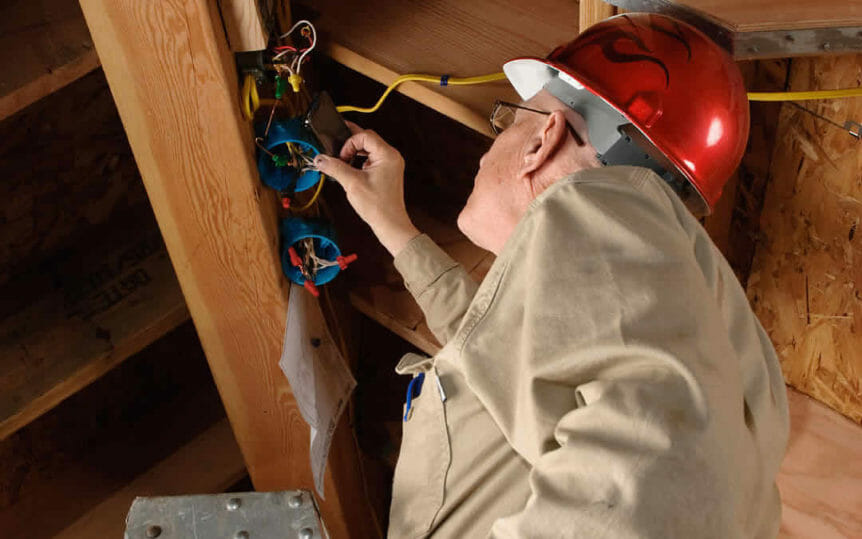
John Moore Services Electricians Work Hard For Their Certifications
For most people, electrical work seems like some foreign language that we can’t quite wrap our heads around. For others, it’s just what they love to do- and they learn to do it well. We know this because the Texas Department of Licensing and Registration has some pretty specific regulations when it comes to issuing licenses to all the different kinds of electricians in our state.
Like other industry professionals we have talked about before, electricians in Texas have to go through a thorough process of applications, examinations, education, and this year, a few significant changes within the requirements. Texas takes licensing very seriously, and we wouldn’t want it any other way.
As we always emphasize, it’s important that you know who you are dealing with when letting people into your home. Safety and trust are what we want our customers to feel when John Moore electrical technicians come to the house. That’s why we have mapped out an easy guide to the process men and women go through to become electrical professionals in Texas- total transparency so you know who we are and what we do! With this, you will know what it takes to become an electrical technician and what to look for when planning to fix a problem or make changes in your home’s most important systems.
Electrical License Application
Like all other licenses in Texas, aspiring professionals must go through an application process before they are even considered eligible to take an exam for the title and skill they want to acquire. There are so many positions available for applicants. There are also different types of licenses available. Business Licenses are available for Electrical Contractor, Electrical Sign Contractor, and Residential Appliance Installation Contractor. Individual Licenses are also available: Master Electrician; Master Sign Electrician; Journeyman Electrician; Journeyman Sign Electrician; Journeyman Lineman; Residential Wireman; Maintenance Electrician; Residential Appliance Installer; Electrical Apprentice; and Electrical Sign Apprentice.
However, as everything else in life, it’s never as simple as wanting it and getting it. Each license requires tons of previous work experience under the supervision of a higher-title license holder. According to Mike Pace, a John Moore electrical technician and Quality Control worker, every technician has to start from the bottom and work their way up.
“When you decide to be an electrician you have to go through an apprenticeship,” Pace said. “First you take some classes where they teach you as much as you can before you go out to work with an electrical company that you can learn from. Then, you get your apprentice license- all you have to do is work for a trusted company and you’re solid. That’s where you get your background.”
Then, to move on even further, the requirements start rolling on in.
“You have to be an apprentice for two years and then you can get your Wireman license,” Pace said. “If you’ve been an apprentice for four years, you can get your Journeyman license. After 6 years, or 2,000 hours of experience as an apprentice and a minimum of 2 years as a Journeyman, you can apply for Master. It’s all stepping stones.”
Also, each license has a specific exam and fee, so applicants have to make some decisions regarding how far they want to go in the field. After the application has been submitted, it is reviewed and then approved or rejected. Once approved, the Texas Department of Licensing and Regulation (TDLR) will then allow the applicant to finally take the required exam.
Electrical Exams
For each License, every person must first file an application with TDLR. Then their application will be evaluated and if all the qualifications are met, they will be eligible to sit for the examination.
Of course, how rigorous the exam is all depends on the title the person is testing for. Pace said that even apprentices now have to take an exam to move on to the next level of expertise.
“The first exam you can do is the Residential Wireman license, which has questions about old residential applications, among others,” he said. “All the exams are open book tests- they don’t test you on what you know, but really on if you know where to find that information and execute it well. The information is what is most important.”
Electrician License Renewal
According to the TDLR website, those who want to get their license up and running again must renew it within 18 months of the date that it was issued (with the exception of Contractors and Residential Appliance Installers, who don’t need continued education to renew). Those required, however, receive a reminder postcard from TDLR around 60 days before the license expires, but ultimately the duty to renew a license before it expires lies in the capable hands of the license holder. Responsibility, people!
When it comes to renewing an electrician license, it’s probably the easiest part of the process. Just complete the required amount of continued education, do a year’s worth of work extremely well, and renew online. It’s really as simple as that! Now, the hard part is getting those hours of learning in.
Continued Electrical Education
Everyone has to take an annual continuing education course that will allow the person to not only renew their current license, but to move up the ladder of knowledge and specialization in the world of electrical work. The four-hour course, which is available online, must be completed during the effective date of the license and touch on three main points: National Electrical Code (NEC), as adopted under Title 8, Occupations Code §1305.101, or the current version of the NEC, as approved by the National Fire Protection Association (NFPA); State law and rules that regulate the conduct of licensees; and Safety as defined in the NFPA 70E. So, if your license expires September 1, 2014, you must complete continuing education courses between September 1, 2013 and September 1, 2014.
No matter what license they hold, Pace said that an electrician should always strive to go higher by reaching all across the board for knowledge. As for him, he’s thinking about his next and last license exam- Master Electrician.
“There are all these different kinds of electrical technicians, but I don’t buy that,” he said. “I refer to myself as an Electrician. I have worked all the different aspects of the field and I make it a point to learn as much as I can all the time and go the farthest I can. I think it’s a great opportunity for any electrician in Texas to continue and be experts in everything available to them.”
Changes for the Future
Sometimes, change is inevitable. But usually, change brings new and better things, and that is exactly what is currently happening for Texas electrical technicians.
On November 21, 2013, the TDLR amended the Electrician administrative rules to apply changes in the Electrician law (Yes, it exists!) created by House Bill 796. These changes took effect January 1, 2014 and will:
- add a new license type, Journeyman Lineman (available since June 1, 2014!)
- allow a Journeyman Lineman licensee to get a reciprocal license in an equivalent state without having to take an exam
- add continuing education requirements for Journeyman Lineman licensees, consistent with other TDLR license classes
- add journeyman lineman to the list of emergency licenses that may be granted in case of a declared emergency
- and lastly, update technical requirements by adopting the most recent edition of the National Electrical Code (NEC) as adopted by the National Fire Protection Association, Inc.
These changes are great news because not only has a new license been added to the list of possible titles an aspiring electrician can have, but it keeps code current and safe for you and your family when getting any work done to your home’s electrical systems.
As for the new NEC- it takes effect on September 1, 2014, y’all, so get ready! The 2013 ruling by the Texas Commission of Licensing and Regulation, which oversees the TDLR, set the 2014 NEC as the “minimum standard” for all electrical work in Texas covered by the Act. It also states that any non-exempt electrical work started on or after September 1, 2014 must be installed in accordance with the 2014 NEC. Also, beginning September 1, 2014, all examinations for state electrical licenses will be based on the 2014 NEC. Electrical professionals in Texas now have something new to learn, that’s for sure!
Oh, and one more thing:
On November 21, 2013, the Texas Commission of Licensing and Regulation also approved a huge reduction in the license and renewal fees for many license types in the Electricians program! And who doesn’t like saving money? The TDLR estimates this fee reduction will result in a savings for licensees of $660,890 annually, with an estimated five-year savings of $3,304,450- that’s amazing news for Texas’ hardworking electricians out there who need a few extra dollars in their pockets instead of paying so much for licensing fees.
At John Moore, we always support all of our employees- electricians or not- who work hard and always do their best. That’s why we have some changes of our own! We are constantly striving to be the best at what we do so you can trust us when letting us into your home, and that starts with educating our John Moore family.
“We just recently started a bunch of great electrician training programs at John Moore to help all the guys expand their knowledge in the field,” Pace said. “We already have numerous apprentices that are attempting to take the test to get their next license, so we are just focusing a lot on them right now so they can get where they want to be. We are always going and learning. It’s not only just good for them- it’s good for the company and for the customer, too.”
